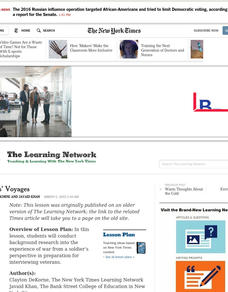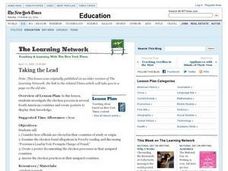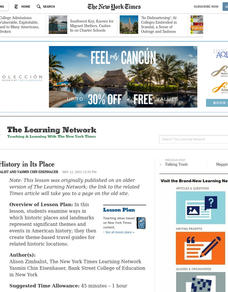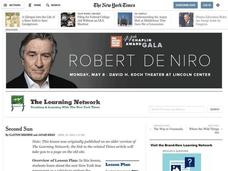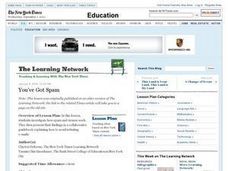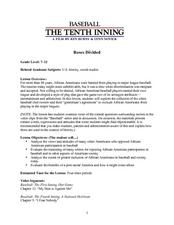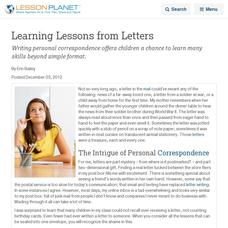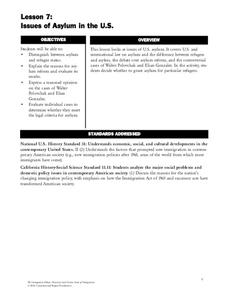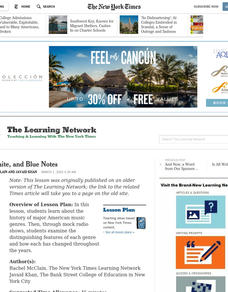PBS
Ebola Outbreak
As of April, 2016, more than 28,000 suspected cases of Ebola were recorded in Western Africa with over 11,000 human deaths. Classes discuss the Ebola virus outbreak in 2014 and then groups develop an action plan based on...
Curated OER
Sewing Unit (Textiles)
Get out that sewing machine it's time for a textile project. The class learns how to use a sewing machine, read a pattern, and create a simple article of clothing. They identify the sewing machine parts, use an iron, and think about...
Curated OER
Feeding Frenzy
Young biologists take a look at the myriad of ways that animals increase their chances of surviving in the wild. The adaptations help animals hide, hunt, and attract a mate. This activity specifically explores how insect mouth parts are...
Curated OER
Veterans' Voyages
Introduce your middle and high schoolers to a different perspective on war: that of soldier's. Read Guisseppi Ungaretti's poem "Vigil" to kick-start this lesson. After discussing his perspective, read "The Screaming Eagles Fly to...
Curated OER
Fighting for Control
Engage your class in a class discussion examining and defend different sides of an argument about whether the Environmental Protection Agency should have the legal authority to regulate carbon dioxide emissions. They will have to...
Curated OER
Old Hobbits Are Hard to Break
Explore film adaptation of literature with this lesson, which focuses on the world of film advertisements. Middle schoolers discuss various films (including The Lord of the Rings) and create advertisements for a pretend film based on a...
Curated OER
Cell respiration
Three lab guides are given here that detail experiments to illustrate the oxidation of glucose for the production of ATP. The first will compare photosynthesis and respiratio and show theimporatnce of both to plants. The next will show...
PBS
Climate Change as a Scientific Theory
Get your class thinking about climate change as a scientific theory. Guided by a handout, emerging earth scientists read articles and take notes about glaciers and sea ice. To conclude, they write an evaluation of the evidence for...
Curated OER
Taking the Lead
Students discover how officials are elected in countries of interest to them. After reading an article, they examine election fraud allegations in Peru. They create a poster showing the election process and assess them in a written essay.
Curated OER
Recurring Nightmares
Does history really repeat itself? Encourage your middle and high schoolers to answer this age-old question by reading the attached articles on the Cuban Missile Crisis of 1962 and the Iraq Crisis of 2002. How similar or different are...
Curated OER
Putting History in its Place
Examine ways in which historic places and landmarks represent significant themes and events in American history. Then create theme-based travel guides for related historic locations. This lesson plan requires informational reference...
Curated OER
Remembrance of Things Past
Engage critical and social thinking by exploring the value of language and word choice. The class considers the article "The Silence of the Historic Present" and analyzes several presidential speeches. They engage in class...
Curated OER
Second Sun
Explore the elements of newspaper from the view of the front page. Young analysts create a front page of a newspaper geared toward teen readers. They use their inference skills to determine why some front pages are more eye-catching than...
Curated OER
A Matter of Interpretation
Was the fatal crash of EgyptAir Flight 990 cause by mechanical failure or was it an act of sabotage? The crux of the debate and the subsequent controversy centers on translation of an Arabic phrase uttered by the pilot. The New York...
Curated OER
Keep Heritage Alive
Youngsters share ideas about cultural and/or spiritual rituals by participating in a fishbowl discussion, which explores the ways rituals have changed over time. They write reflective essays about their own cultural traditions.
Curated OER
You've Got Spam
What is spam mail? Discuss examples of spam mail and read about the "Can Spam Act." After reading the New York Times article attached, brainstorm why the act hasn't had much impact yet. Several discussion questions are listed.
Curated OER
The Many "I's" In "Team"
Pupils examine the negative behavior of an Olympic athlete. They look at how his choices affected the team as well as his position on the team. They consider the many reasons why unity is important among the members of an organization...
Curated OER
Colonial New York Slave Codes: Law and Order
Build a historical perspective from four different points of view. Young historians take on the role of a slave-owning white person, non-slave owning white person, slave, or free African-American person and imagine what life would be...
PBS
Baseball: The Tenth Inning - Bases Divided
Baseball is a relatively high-interest topic through which social studies classes can explore racial prejudice in the US. Video clips provide much of the background information that groups record on their handout and then share with the...
Curated OER
Learning Lessons from Letters
Writing personal correspondence offers children a chance to learn many skills beyond simple format.
Curated OER
Barter vs. Money
First graders listen to the book, Sheep in a Shop, that leads them to think about making financial decisions, trading, and the barter system. After the book is read aloud, a discussion ensues about some of the things that the sheep...
Community High School of Vermont
Habits of Mind
Here is a comprehensive unit on the 16 Habits of Mind that includes a wide variety of activities, worksheets, differentiation strategies, and instructor notes. The unit consists of 18 lessons and offers an organized progression of...
Constitutional Rights Foundation
Issues of Asylum in the U.S.
Who gets to come to the United States? Examine cases of individuals seeking asylum with an informative reading passage that includes examples, statistics, and representations of public opinion regarding asylum. Groups then go on to...
Curated OER
Red, White, and Blue Notes
Students explore the history of major American music genres. Then, through mock radio shows, students examine the distinguishing features of each genre and how each has changed throughout the years.
Other popular searches
- Teaching Note Taking Skills
- Note Taking Skills, Science
- Note Taking Skills Science
- Cornell Note Taking Skills
- Note Taking Skills Research
- Elementary Note Taking Skills
- College Note Taking Skills





